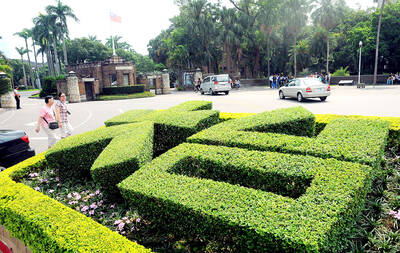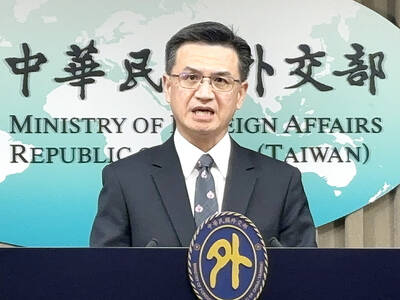Leaders of the 27-nation EU have pledged they will stick to a pricey plan for deep cuts in greenhouse gas emissions, saying the recent meltdown of financial markets must not deter efforts to combat global warming.
After presiding at a two-day EU summit, French President Nicolas Sarkozy said on Thursday that despite some misgivings about the cost, “climate change is so important that we cannot use the financial and economic crisis as a pretext for dropping it.”
The summit capped weeks of turmoil that devastated financial markets around the globe, sparked fears of a serious economic slowdown and revealed EU governments stumped for a coherent approach to protect banks, mortgage lenders and depositors.
Only in the last 10 days did the EU put together a US$2.3 trillion emergency bailout for the banking sector that was approved at the summit.
Taking a cue from British Prime Minister Gordon Brown, the leaders called for a global approach to revamping the world’s financial system in hopes of preventing a repeat of the credit crisis.
Sarkozy and European Commission President Jose Manual Barroso are to meet with US President George W. Bush today at Camp David, Maryland, to lay the groundwork for a global summit to overhaul the financial system.
Ideas that the Europeans discussed included a meeting of the world’s major economic powers — including China, Russia and India — next month, possibly in New York, similar to the 1944 meeting in Bretton Woods, New Hampshire, that laid down rules for international trade and financial relations.
Other issues the Europeans want discussed are supervision and regulation of markets, reductions in bank secrecy, early warning systems for detecting impending crises, and a framework for a rapid, coordinated international response to a crisis.
For the first time, the leaders took a step toward EU supervision of banks — something Britain and other nations have resisted for years.
They said national watchdogs need to meet at least once a month, and they also set up a financial crisis group to swap information.
“We want a package that will be tolerable for the poorer member states,” Polish Prime Minister Donald Tusk said.
Sarkozy said he would try to forge a fair deal for sharing the burden, to avoid penalizing the bloc’s former communist nations that depend largely on carbon-heavy coal for their power.
The EU climate package includes steps to force major polluters such as energy generators, steel makers and cement producers to pay billions into a cap-and-trade emissions program costing nearly US$70 billion a year in polluter fees.
The plan is to enact the package next year and draw the US and other nations into a broad international program for dealing with global warming.
To help European industry at a time of economic slowdown, EU leaders said they will consider a stimulus package. Sarkozy pointed particularly to the auto industry, which is demanding a US$54.5 billion bailout fund.
“Can you ask the European car industry to provide clean cars, change the whole industrial apparatus, without giving them a helping hand?” Sarkozy said.
He said European car makers might need an injection of state cash, similar to the US government’s US$25 billion low-interest credit line for General Motors Corp, Ford Motor Co and Chrysler LLC announced last month.

Taiwan has experienced its most significant improvement in the QS World University Rankings by Subject, data provided on Sunday by international higher education analyst Quacquarelli Symonds (QS) showed. Compared with last year’s edition of the rankings, which measure academic excellence and influence, Taiwanese universities made great improvements in the H Index metric, which evaluates research productivity and its impact, with a notable 30 percent increase overall, QS said. Taiwanese universities also made notable progress in the Citations per Paper metric, which measures the impact of research, achieving a 13 percent increase. Taiwanese universities gained 10 percent in Academic Reputation, but declined 18 percent

Chinese President Xi Jinping (習近平) yesterday met with former president Ma Ying-jeou (馬英九) at the Great Hall of the People in Beijing, with Xi’s opening statement once more emphasizing that people on both sides of the Taiwan Strait are Chinese and that foreign intervention cannot change their inevitable unification. Xi said that 5,000 years of history of zhonghua minzu (中華民族, ethnic Chinese group) have seen their ancestors move to Taiwan to establish new lives, while also documenting them fighting side-by-side against foreign forces and finally freeing Taiwan. “Both sides are Chinese,” and there are no issues that cannot be worked through, he

BULLY TACTICS: Beijing has continued its incursions into Taiwan’s airspace even as Xi Jinping talked about Taiwan being part of the Chinese family and nation China should stop its coercion of Taiwan and respect mainstream public opinion in Taiwan about sovereignty if its expression of goodwill is genuine, the Ministry of Foreign Affairs (MOFA) said yesterday. Ministry spokesman Jeff Liu (劉永健) made the comment in response to media queries about a meeting between former president Ma Ying-jeou (馬英九) and Chinese President Xi Jinping (習近平) the previous day. Ma voiced support for the so-called “1992 consensus,” while Xi said that although the two sides of the Taiwan Strait have “different systems,” this does not change the fact that they are “part of the same country,” and that “external

UNDER DISCUSSION: The combatant command would integrate fast attack boat and anti-ship missile groups to defend waters closest to the coastline, a source said The military could establish a new combatant command as early as 2026, which would be tasked with defending Taiwan’s territorial waters 24 nautical miles (44.4km) from the nation’s coastline, a source familiar with the matter said yesterday. The new command, which would fall under the Naval Command Headquarters, would be led by a vice admiral and integrate existing fast attack boat and anti-ship missile groups, along with the Naval Maritime Surveillance and Reconnaissance Command, said the source, who asked to remain anonymous. It could be launched by 2026, but details are being discussed and no final timetable has been announced, the source